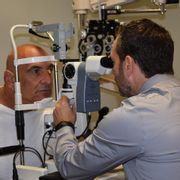
Many conditions can affect the eyes and require more intense vision care, such as astigmatism. It's a standard eye issue that occurs when the lens or the surface of the eye, the cornea, is irregularly-shaped. Light entering lenses and corneas that are not entirely round does not bend evenly, resulting in vision problems. The following guide further explores astigmatism, including typical symptoms and treatments.
Causes

What causes astigmatism remains unknown, though vision care specialists cite several risk factors. It can occur because of eye injuries, diseases, and surgery that change the shape of the lens or cornea. Other causes include a family history of astigmatism and keratoconus, a rare disease where the cornea thins, takes on a cone shape, and bulges out.
Reading in dim lighting does not cause astigmatism, though it does cause eye strain and related symptoms, such as facial pain and headaches.
Symptoms
Astigmatism is grouped with other refractive errors, including nearsightedness and farsightedness, which can cause blurry vision from issues processing incoming light.
Other common astigmatism symptoms include challenges seeing clearly at night, squinting, eye irritation, eye strain, and headaches.
Eye doctors diagnose astigmatism with comprehensive eye exams that include using an autorefractor tool that shows how light bounces off of the back of the eye. Other commonly-used tools include the keratometer, which measures corneal bends.
Treatments
Most astigmatisms are treatable using corrective glasses or contacts that compensate for bends in the cornea or lenses. Severe cases can require eye surgery, such as refractive corrections to reshape the cornea using a laser beam.
Specific types of refractive surgery include laser-assisted in-situ keratomileusis (LASIK), in which a thin flap is made in the cornea that lets the surgeon reshape it with a laser. In laser-assisted subepithelial keratectomy (LASEK), the surgeon thins the corneal coating with special alcohol before applying the laser.
While there is no cure for astigmatism, proper vision care helps your eyes stay healthy and includes scheduling routine eye exams, consuming eye-healthy foods, and wearing sunglasses outdoors year-round.
Keep your eyes at their healthiest with good habits and routine vision screenings at Brunswick Optical in Northeast Ohio.This independent vision care center provides a wide range of brand-name eyewear in addition to eye exams. Walk-ins are also welcome. Call (330) 741-3407 to schedule an appointment.
About the Business
Have a question? Ask the experts!
Send your question

